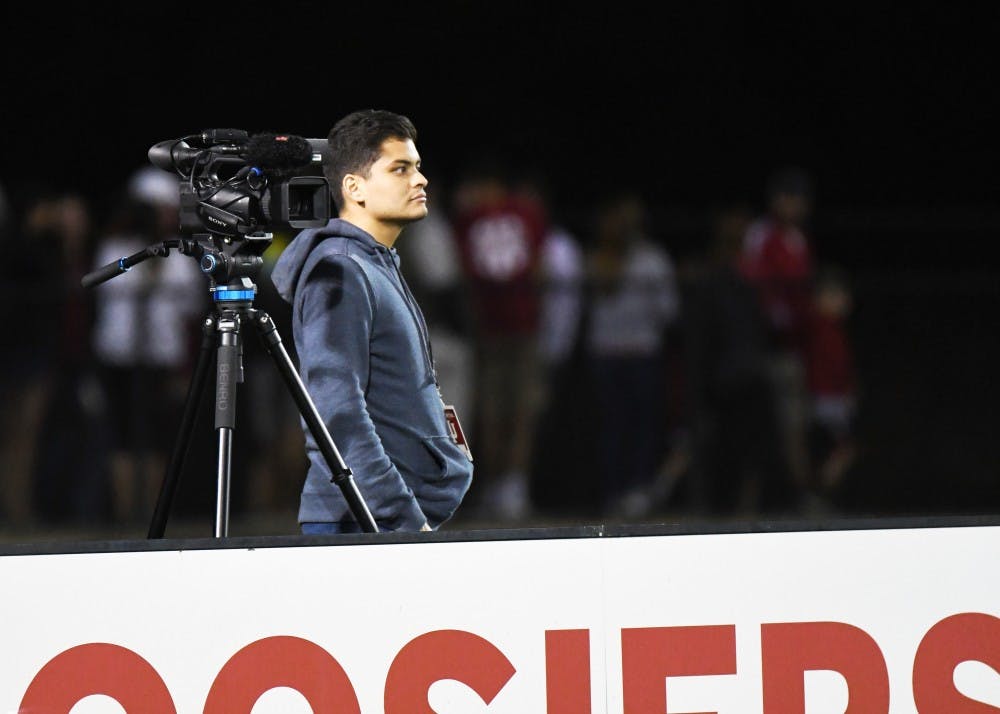Senior Juan Diego Alvarado was offered an opportunity that has never been done before on campus, and he made his debut last Tuesday to pave the way for future students.
This season, IU men's soccer will offer Spanish radio broadcasts for select games on IUHoosiers.com for the first time in program history. The first broadcast occurred Sept. 26 when No. 1 IU played No. 7 Notre Dame at Bill Armstrong Stadium.
Alvarado, a former Indiana Daily Student reporter who covered field hockey and men's tennis last year, was on the call for that first broadcast with color commentator Adrian Paneto.
“We have a lot of diversity here at IU, and I want people to adapt to a new language or a new environment,” Alvarado said. “It’s hard to embrace change, and it can be hard to step out of our comfort zones. I have the challenge of broadcasting games in a different language, and I’m going to do the best that I can to hopefully open up opportunities for future students.”
The opportunity to broadcast men’s soccer games in Spanish was presented to Alvarado after Edward Koton, WIUX Sports Director and Big Ten Student U Broadcaster, spoke with Jeremy Gray, IU senior associate athletic director for strategic communications and fan experience.
"Jeremy asked me about it one morning and I said yes because I knew this was something that I wanted to do, so I had to take my shot,” Alvarado said.
With the help of Gray and Koton, Alvarado was given an opportunity that no other student has been offered.
“My wife is a Spanish professor at IU, so I asked her who I should talk to about this and she gave me some contacts on campus,” Gray said. “That ultimately led me to ask Eddie who I could speak to in order to broadcast soccer games in Spanish. Juan made my life really easy because he said he was available for all games to broadcast, and he even sought out his own color commentator."
Alvarado was born in Guayaquil, Ecuador, and grew up playing both soccer and tennis.
“Even though I played tennis in high school, I always had a passion for soccer,” Alvarado said.
After moving to the United States at age 15, Alvarado attended a boarding school in Boca Raton, Florida. While there, he improved his English speaking skills.
He said he had a thick accent when he first arrived, and moving to Florida helped him become fluent.
One of Alvarado’s goals is to have fun while improving his broadcasting skills. He said he wants to add his own touch to his broadcasts.
“I always watched TV and listened to radio broadcasts of people calling the games,” Alvarado said. “I thought it was something really cool to do and I really admired the way they brought energy into the games.”
Not only does he want to do a good job, he said he also wants to link the Latino community closer to the University.
Broadcasting games in a non-English language isn’t something new for IU athletics.
Men’s basketball games have been broadcast in Mandarin on IUHoosiers.com in the past, but this marks the first time a Spanish-language option has been presented for men’s soccer matches.
“Indiana is known for its language and linguistics program,” IU Athletics Director Fred Glass said. “If we can merge foreign languages with IU athletics I think it can be a good marriage in the future.”
Glass said broadcasting soccer games could do wonders for the University as far as recruiting international athletes and students. He said this opportunity shows how inclusive IU is to all of its students.
“It gives us great exposure, giving Spanish-speaking students a broadcast they can listen to,” Glass said. “I think it helps underscore that we are progressive on inclusion and being a welcoming place for our international students. We value them, and it sends the right messages that Indiana is a place that values inclusion.”
In addition to the Notre Dame match, Alvarado will also broadcast IU’s games against Kentucky, Butler and Wisconsin, all of which occur during the month of October.
Gray said he hopes this not only brings in more students and fans, but he also said he wants more students to be encouraged to try and become fluent in a different language while at IU. He said he hopes it opens more doors for students at the Media School by giving them another language to learn and broadcast with for jobs after graduation.
“I don’t know that people have really addressed how students become much more marketable in sports broadcasting and media if you can speak multiple languages,” Gray said. “I think that this is a new path, and there will be more Juan Alvarados to follow his lead. Maybe one day we’ll see a former Media School student broadcasting the World Series in Spanish one day, and doing a hit on ESPN in English the next.”






